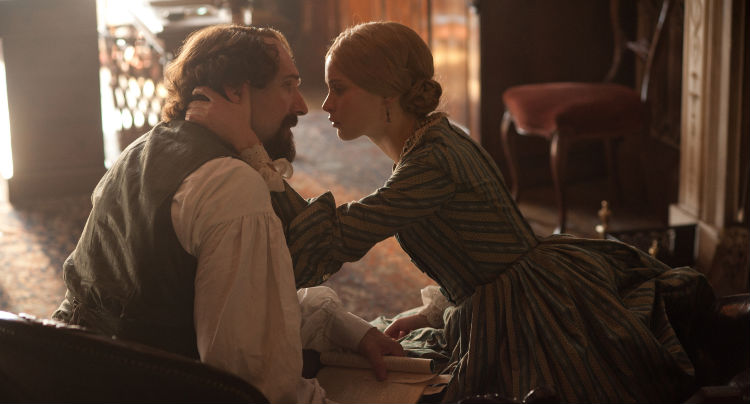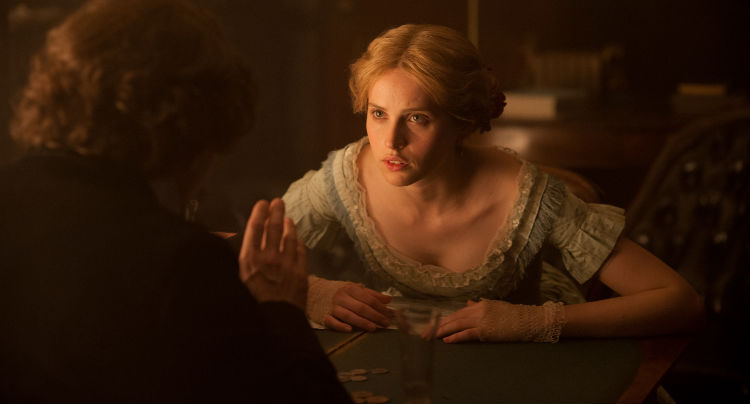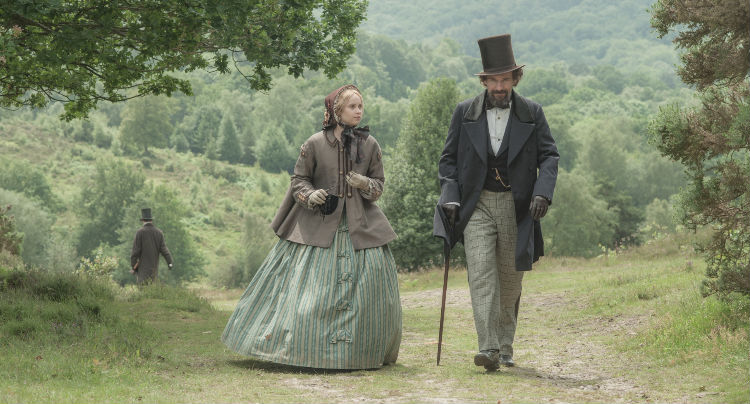
The central romance feels too cold-to-the-touch and blasé to deserve such a grand production.

The central romance feels too cold-to-the-touch and blasé to deserve such a grand production.
The Invisible Woman, Ralph Fiennes sophomore directorial effort (following up 2011’s Coriolanus), tells the true story of the love affair Charles Dickens (played by Fiennes) had with a much younger woman, actress Nelly Ternan (Felicity Jones), with a touch so delicate and soft it fails to leave a lasting impression. Though exquisitely designed and speckled with a handful of moments that are truly inspired, the central romance feels too cold-to-the-touch and blasé to deserve such a grand production.
The film opens years after Dickens’ death, with an older Nelly, now married, watching her teacher husband’s students rehearsing their production of “The Frozen Deep”, one of Dickens’ plays. Through the use of thinly-veiled expositional dialog, we learn that everyone with knowledge of her relationship with the author is under the impression that is was a platonic one (Dickens took the secret of their affair to the grave). We then flash back to the time to the beginning of their relationship to learn its true nature as we rifle through Nelly’s memories.

Charismatic, gregarious, and glamorous, Fiennes’ turn as Dickens is captivating. Following a theatrical performance, Dickens–45 years old and at this point an eminently beloved literary celebrity–meets an 18-year-old Nelly, her three sisters, and their mother Frances (Kristen Scott Thomas), all actresses. Of the sisters, Dickens feels a gravitation toward Nelly, whose meekness combined with the intimidation of Dickens’ advanced age and stature makes her weak in the knees. Frances, though not thrilled at the thought of the relationship, sees it as an opportunity for she and her girls to ride in more advantageous social circles.
Dickens is married to a heavy-set, regular-looking woman named Catherine (Joanna Scanlan), mother to his ten children. Now, you’re probably thinking, “I know what comes next! The big-headed Dickens, unfulfilled and suffocated by his marriage and home life, casts his ordinary wife aside in exchange for the young, beautiful mistress, resulting in a mountain of heartbreak and high drama!”
You’d be right, save for that last part about the heartbreak and high drama. Dickens does cast Catherine aside via a letter to the editor of the Times in which he announces their separation, and he does steal away with the beautiful Nelly. What’s strange and confusing is how everyone involved in the awful ordeal treats it like it’s a completely acceptable, no-big-deal “arrangement”. Everyone acts so apathetic and proper in their reaction to the affair that we as the audience can’t help but react apathetically as well.

The big surprise of the film is Scanlan, who has a couple terrific moments fueled by raw human emotion, each a welcome jolt that saves us from the sauntering, lifeless slog that is the rest of the film. Her reaction to the aforementioned Times letter is crushing, and a quiet conversation she shares with Nelly, in which she clears the air with utmost class and dignity, is unforgettable.
Fiennes does a good job as well, and Dickens’ work absolutely drips of his tongue as he recites it. It’s his scenes with Jones that leave a lot to be desired. There’s no clear indication or demonstration of why he loves this girl so much he’d leave his family behind for her. This is a crucial error, as this relationship is the prime focus of the film. And yet, on screen we feel nothing from them in the form of passion, longing, or chemistry. This is an empty romance, which consequently makes the film as a whole feel emotionally anemic.
The Period costume and set design is marvelous, with Fiennes doing a good job of capturing the finer details with his camera. In fact, I constantly found myself taking momentary vacations from the story to admire the elaborate furnishings, because whatever British ho-humming the characters on screen were doing was losing its grip on me.